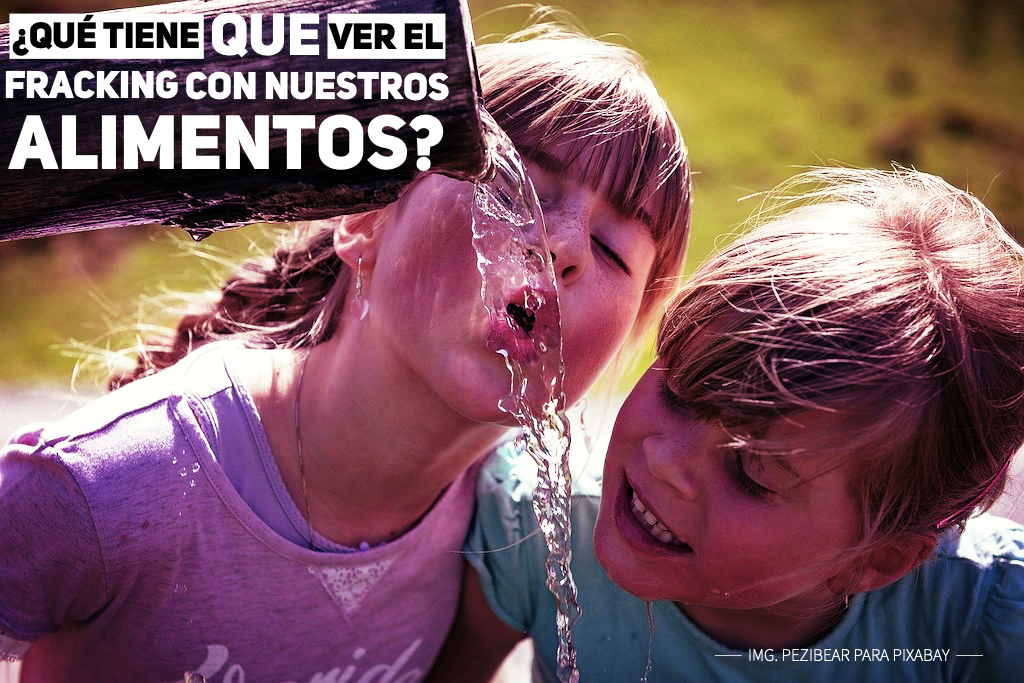
Fracking in our food: how is it possible?
Share
What does fracking have to do with our food?

Img. Last Frontier Post
As good members of our families we want the best for them and for us, of course. For this reason we try to live and eat as best as our pockets allow.
If we want a good quality of life, we should be interested in and take care of those who provide it for us, right? It is our planet, our mother earth.
According to Rob Herring, editor of the online magazine The Need to Grow/ Earth Conscious Life at www.earthconsciouslife.org , when it comes to raising awareness about caring for our planet, two controversies immediately arise:
1. Fracking,
Fracking is short for fracturing. Although it is an “efficient” practice for extracting the planet’s precious resources, fracking has many negative impacts on the environment and its inhabitants… including us humans.
Fracking involves injecting liquid, primarily water, at high pressure into the earth to “fracture” or crack it in order to force out oil, gas, and other commodities. It also requires tons of energy consumption and pollution.
This practice is also known to cause tremors and earthquakes, threatening surrounding communities.
2. Agriculture ,
Or better, industrial agriculture that produces large quantities of food, commodities and other resources. But at what price? Polluted water, polluted communities, ocean death zones, to name a few.
The pros and cons
National Geographic mentions the intervention of Daniel Yergin, vice president of the global consulting firm IHS before the United States Congress, who encourages this practice since “in the USA alone it maintains 1.7 million jobs and that could increase to 3 million by 2020.
Since 2012, this “revolution” has added $62 billion to federal and state government revenues, a figure that could rise to $113 billion by the second half of 2020.
In addition, the production of natural gas, which is what they are focusing on, will save them between $350-450 billion dollars that are currently spent on importing oil and that, instead, “could” be used to invest in future alternative energies.” ( 1 )
What Mr. Yergin is alluding to is that the money saved by exploiting gas sources and not importing oil can serve as a “bridge” to optimize future renewable energies such as solar and wind.
The negative effects

Img.: Arcaion
The GAO or Government Accountability Office of the United States Congress in several publications states that "the exploitation of shale oil and gas poses risks to air quality, generally as a result of:
- Exhaust gases from engines due to increased truck traffic,
- Emissions from diesel-powered pumps used to power the equipment,
- Gas that is flared or vented (released directly into the atmosphere) for operational reasons, and
- Unintentional emissions of pollutants from faulty equipment or temporary storage areas in reservoirs.
Similarly, several studies and publications reviewed by GAO indicate that shale oil and gas development poses risks to water quality due to contamination of surface water and groundwater resulting from erosion caused by soil disturbance, spills and releases of chemicals and other fluids, or underground migration of gases and chemicals ."
A study published by scientists at MIT (Massachusetts Institute of Technology) USA, indicates that in the shale boom, there is a risk of atrophying renewable energy programs altogether. While taking advantage of this “short-term gift”, treating gas as a “bridge” to a low-carbon future, it is crucial not to allow the greater ease of the short-term task to erode efforts to prepare for a landing at the other end of the bridge.
In other words, it is an attitude of “let's take advantage of the moment and we'll see later.” MIT scientists fear that before the natural gas boom ends, we will fail to consolidate renewable energy for carbon reduction.
What does fracking have to do with agriculture and the food that reaches our plates?
You may be surprised to learn that fracking and conventional agriculture are linked in unexpected ways. Both fracking and large-scale agriculture greatly harm wildlife and humanity, but how does this happen?
- Conventional fertilizers are obtained through fracking
These include chemical and synthetic fertilizers such as nitrogen, which is used to feed large areas of corn, soybeans, wheat and other crops.
These in turn are used to feed large herds of cattle in farms, WHICH ARE AMONG THE MAIN EMITTERS OF GREENHOUSE GAS ON THE PLANET!
Agricultural chemicals from fracking are also found in the main fertilizers for our gardens and orchards. For example, a normal fertilizer for any garden.

According to Tom Philipott of the online magazine Mother Jones , chemicals applied to lawns are a major reason for the death zones in New Mexico, but so are fertilizers used on large areas of crops.
Latin America
From Mexico to Patagonia, fracking operations are spreading across the region with the promise of access to new hydrocarbon reserves and resources that will allow for high extraction rates to be maintained. This promise is shared equally between countries that have historically produced hydrocarbons, such as Colombia and Bolivia, as well as net importers of such resources, such as Chile and Uruguay.
None of the countries where this technique is applied, or where it is planned to do so, have comprehensive knowledge of its risks and the scope of the serious and irreversible damage it can cause to the environment and human health.
According to studies by Cornell University (USA), it is estimated that, on average, 12% of total gas production in shale deposits leaks into the atmosphere during the entire project cycle, which covers everything from the extraction of gas from the well to the final consumer.
- Some organic foods are contaminated by fracking that result in no be organic at all
Some “certified” organic farms, knowingly or unknowingly, are directly irrigating their crops (foods you buy at the market as organic) with these chemicals. And all this because of fracking.
But how does this happen?
Fracking is done with water, as a result, there are tons of water left over once the billing process for a piece of land is complete.
Often, this water is mixed with debris from the fracking process – oil, natural gas or other chemicals. This is not organic or biodegradable.
In any case, it has been a great business to sell this water to farmers, especially in arid areas that need it, such as in the center and south of the state of California, USA, where fracking and industrial agriculture have coexisted for quite some time.
So agriculture, our food sources and fracking are connected, for the moment .
The positive side
According to a 2016 report by Última Frontera, a growing number of social organizations, communities and institutions are structuring themselves to confront this harmful technique, dismantling the discourse of businessmen and governments that seek to position these energies as the only possible way out, since it is considered that in a period of 20 years "the greenhouse gas footprint of shale natural gas will be worse than that of coal or oil."
As citizens and family members, it is our responsibility to monitor and prevent these harmful techniques from being implemented in our countries, for our health and that of our families.
In Mexico, Colombia, Brazil, Chile and Argentina, there are already policies or regulations that promote and regulate fracking activities, with varying levels of depth and detail. Despite their legal obligations regarding human rights, environmental protection and climate change, the States are NOT implementing effective measures to avoid the serious and irreversible damage that this technique entails, such as prohibitions or moratoriums on this activity.
On the contrary, national regulations have been modified to open the doors and facilitate access to this technique in the territories, as occurred in the case of Mexico, through the Energy Reform of 2013, and in Argentina, through the reform of the hydrocarbon law in 2014.
Fracking is advancing in indigenous communities, peasants, urban areas and even Protected Natural Areas. This has caused the displacement of people and productive activities such as livestock and agriculture, whose coexistence with this technique is impossible. At the same time, complaints and damages caused by fires, spills, explosions, hoarding and contamination of water, air and land by toxic waste, loss of radioactive substances in wells and poor waste management are multiplying.
Complaints are made by the thousands in every country from North to South America.
What can we do from our home and community?
If you care the origin of the food you and your family eat, as well as the health of our planet, the effects of fracking are certainly something to consider... and it's time to take a stand.
- One of the most important things is to make sure of the origin of the food you get for yourself and your family.
- Educate your children on the importance of consuming natural and organic foods, free of pesticides, chemical fungicides and harmful fertilizers that have an effect on human health.
- Support and source your food from small local producers, people you can talk to and even ask what they use to grow and maintain their gardens.
- For people who grow their own gardens, it has been found that by adding a "small grain" (oats or wheat) plus nitrogen-fixing cover crops, farmers can reduce their nitrogen needs by more than 80 percent.
- Likewise, people who sell products that they have grown naturally and with all due care, specifically avoiding fertilizers and contaminated water, must inform the people who buy their products of the quality and value that consuming them has for our lives.
- Please participate, support and sign petitions that force our governments to stop the practice of these techniques, for your own good, that of your family and that of the planet that feeds us and allows us to stay alive and healthy.
Responsible Multinationals Initiative

On 29 November 2020, Switzerland will vote in favour of ethical practices in countries where Swiss multinationals carry out operations, such as Glencore in the Cerrejón coal mines in Colombia, with its 15 sedimentation basins and whose mine pollutes the Ranchería River, among others.
The same company operates a mine in Cerro de Pasco, Peru, where the air and water have been contaminated with heavy metals. The consequences of lead poisoning are particularly severe for children, causing anemia, paralysis and disability.
Is Switzerland ready to vote for ethics on its foreign farms?
The mere fact that the exploiting country is reflecting on its practices, understanding that the planet will not improve if we take care of our country, but we are going to destroy the others for our own comfort, opens a ray of hope to consider how we are behaving in front of the planetary society.
It is an issue that goes beyond patriotism or nationalism; rather, it is up to all of us to become aware of what is happening on the planet and it is a joint effort.
Voting in favour of ethical practices is an acknowledgement by Swiss multinationals that preserving human rights (where children are used to mine), taking responsibility for the destruction of the environment, or not taking advantage of the situation in certain countries where the rule of law is dysfunctional, is a great step forward in terms of global civility.
Will we in Latin America be ready to demand ethical practices from foreign investors? To impose fines and demand compensation from those who destroy the environment, polluting rivers, air, crops? From those who threaten people's health and human rights?
We can start today.
